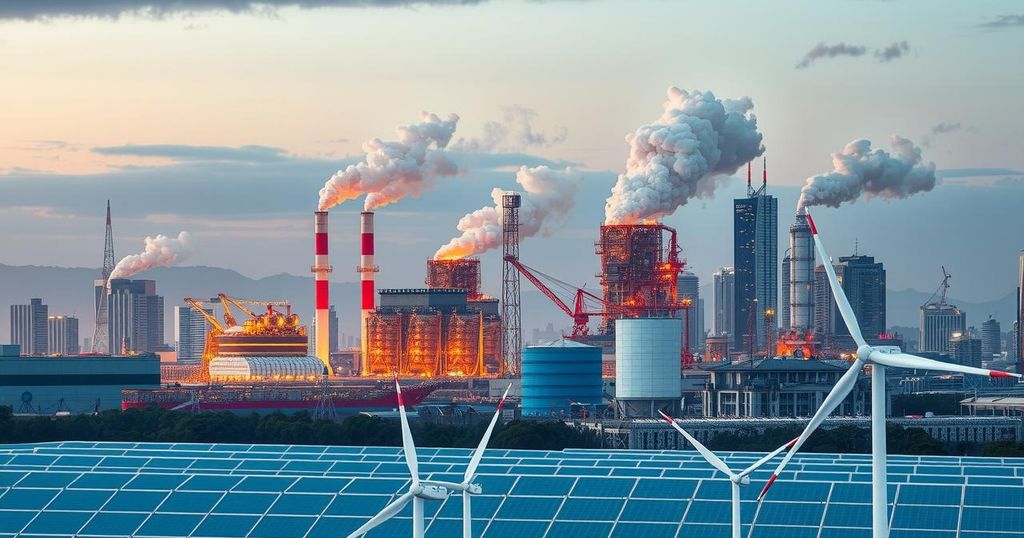AI Chip Manufacturing’s Impact on Climate Progress in East Asia

A Greenpeace East Asia report highlights a 350% increase in electricity consumption for AI chip manufacturing since 2023, largely impacting climate goals in East Asia. Countries are resorting to fossil fuels, threatening environmental targets. The report urges a shift to renewable energy and emphasizes accountability for major chip producers. Concurrently, fears about AI-generated misinformation and the need for stringent regulations are rising.
A recent report from Greenpeace East Asia has revealed a dramatic increase in electricity consumption rates for artificial intelligence (AI) chip manufacturing, which has surged by 350% since 2023. This heightened demand, particularly in East Asian nations such as Taiwan and South Korea, is significantly impacting climate change objectives, as these countries are leading in semiconductor production while struggling with rising electricity needs.
The report indicates that many semiconductor manufacturing facilities in East Asia are relying on fossil fuels for power, jeopardizing environmental sustainability targets. The combined emissions from AI chip production in the Asia Pacific region could result in a setback for environmental initiatives. The energy-intensive nature of AI hardware manufacturing is further compounded by the reliance on fossil fuels, as chipmakers have made minimal efforts to adopt renewable energy solutions.
From 2023 to 2024, electricity consumption for AI chip production is projected to rise alarmingly, predicted to increase by 170-fold by the decade’s end. Such consumption levels are anticipated to parallel the total energy usage of Ireland, surpassing that of many smaller nations. Despite the urgency, countries in the Asia Pacific are constructing new fossil fuel plants to support semiconductor activities, with Taiwan at the forefront of this trend.
The trio comprising South Korea, Japan, and Taiwan has initiated the establishment of LNG plants to accommodate the growing demands of the AI and semiconductor sectors. While this move appears to facilitate immediate production needs, it poses significant long-term repercussions for environmental well-being.
Greenpeace advocates for a commitment to renewable energy from the AI hardware industry, highlighting that firms such as Nvidia and AMD must assume accountability for their environmental impact. The report emphasizes a need for hardware manufacturers to invest in wind and solar energy initiatives as an alternative to fossil fuels.
In a separate discussion, researchers are critiquing an AI-generated paper that denies climate change, initially claiming objectivity. The report references the potential inaccuracies of large language models like Grok 3 AI, which produced the paper titled “A Critical Reassessment of the Anthropogenic CO2-Global Warming Hypothesis.” Experts have noted flaws in the paper’s neutrality and its reliance on authors known for their contrarian views on climate science.
Environmental science professor Mark Neff voiced concerns about large language models, stating that “Large language models do not have the capacity to reason.” Close scrutiny has revealed that authors of the paper have connections to climate change denial and have not disclosed the prompts used for AI generation, raising further questions about transparency and reliability in AI research outputs.
Moreover, as AI technology evolves, experts warn of the potential for misinformation and societal alarm, particularly in healthcare and consumer safety sectors. A report by the World Economic Forum highlights these emerging risks, emphasizing the need for regulatory measures as deepfake technologies proliferate. To ensure secure and accurate AI applications, integrating an enterprise blockchain system is proposed to maintain data integrity and ownership.
These discussions underscore the urgency for a shift toward sustainable practices in both AI manufacturing and the responsible use of AI technologies. A collective effort toward adopting renewables and rigorous standards in AI research is essential in navigating the intersection of technology and climate action.
In summary, the surge in electricity consumption due to AI chip manufacturing poses significant challenges to climate objectives in East Asia, with a marked reliance on fossil fuels threatening sustainability targets. Greenpeace calls for an industry-wide commitment to renewable energy initiatives, emphasizing the responsibilities of major chip manufacturers like Nvidia and AMD. As concerns regarding AI-generated misinformation and environmental impacts grow, a concerted effort is needed to address these pressing issues with transparency and accountability.
Original Source: coingeek.com




